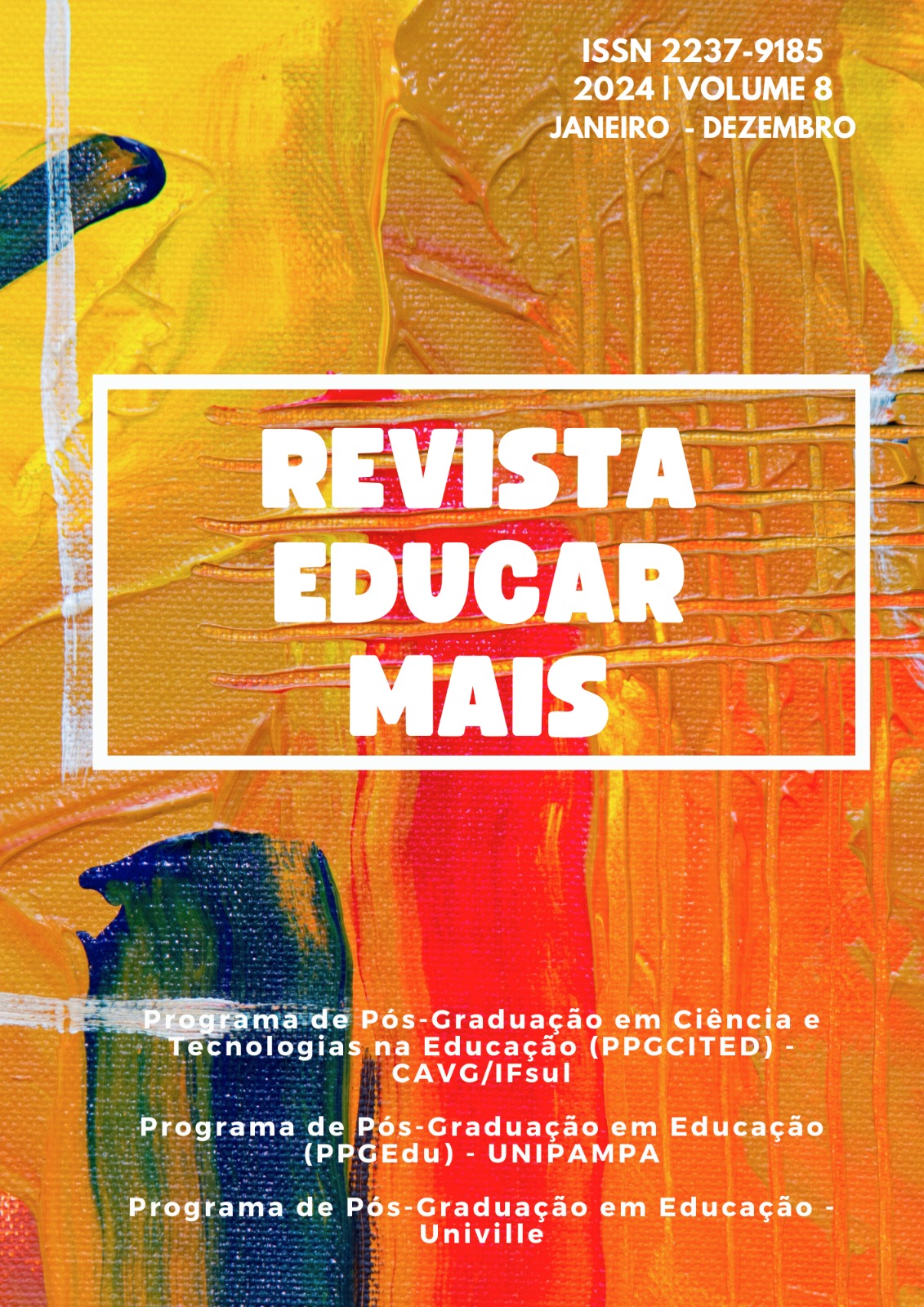Considerations about games, ludicity and design: a review of works frequently cited in Mathematics Educaction
DOI:
https://doi.org/10.15536/reducarmais.8.2024.3818Keywords:
Games, Ludicity, Design, EducationAbstract
This literature review and theoretical essay aims to present discussions about games, playfulness and design through the analysis of three works in these areas, glimpsing their effects in the field of Education. The books in question are Homo Ludens: a study of the play-element in culture, by Johan Huizinga, Man, play and games, by Roger Caillois, and Reality is broken: why games make us better and how they can change the world, by Jane McGonigal. Through a detailed reading of the works in their entirety, it was possible to identify some potentially relevant concepts, namely: paidia, ágon, ludus, agôn, alea, mimicry, ilinx, delegation, flow state, fiero, intrinsic and extrinsic rewards and autotelic activities. Subsequently, the relationship of these concepts with school practices permeated by the use of games in the classroom is verified, corroborating the thesis that the game, as conceived and used by different interlocutors, has functioned as a tool for the constitution of certain types of subjects, aligned with the current neoliberal premises in contemporary society.
Downloads
References
ABT, C. C. Serious games. London: Viking Press, 1970.
BASCÓN-SEDA, A.; RAMÍREZ-MACÍAS, G. ¿Són los e-sports un deporte? El término “deporte” em jaque. Movimento, Porto Alegre, v. 26, p. 1-15, 2020.
BOLLER, S.; KAPP, K. Jogar para aprender: tudo o que você precisa saber sobre o design de jogos de aprendizagem eficazes. São Paulo: DVS, 2018.
BSIC. In depth analysis of the Gaming Industry: part I. [S. l.], 2002. Disponível em: https://bsic.it/in-depth-analysis-of-the-gaming-industry-I/. Acesso em: 26 set. 2022.
BURKE, B. Gamificar: como a gamificação motiva as pessoas a fazerem coisas extraordinárias. São Paulo: DVS, 2015.
CAILLOIS, R. Os jogos e os homens: a máscara e a vertigem. Tradução: Maria Ferreira. Petrópolis: Vozes, 2017.
FOGAÇA, F. Jogos na educação matemática: ferramentas na condução das condutas dos sujeitos neoliberais. 2023. Tese (Doutorado em Educação) – Programa de Pós-Graduação em Educação, Faculdade de Educação, Universidade Federal do Rio Grande do Sul, Porto Alegre, 2023.
GRANDO, R. C. O jogo e suas possibilidades metodológicas no processo de ensino-aprendizagem de matemática. 1995. Dissertação (Mestrado) – Universidade Estadual de Campinas, Campinas, 1995.
GRANDO, R. C. O conhecimento matemático e o uso de jogos na sala de aula. 2000. Tese (Doutorado) – Universidade Estadual de Campinas, Campinas, 2000.
HUIZINGA, J. Homo ludens: o jogo como elemento da cultura. Tradução: João Paulo Monteiro. 9. ed. São Paulo: Perspectiva, 2019.
MCGONIGAL, J. A realidade em jogo: por que os games nos tornam melhores e como eles podem mudar o mundo. Tradução: Eduardo Rieche. Rio de Janeiro: BestSeller, 2012.
SARTORI, A. S. T. O lúdico na educação matemática escolar: efeitos na constituição do sujeito infantil contemporâneo. 2015. Dissertação (Mestrado em Educação Científica e Tecnológica) – Universidade Federal de Santa Catarina, Florianópolis, 2015.
Downloads
Published
How to Cite
Issue
Section
License
Copyright (c) 2024 Fernando Fogaça

This work is licensed under a Creative Commons Attribution-NonCommercial 4.0 International License.
DECLARATION OF RESPONSIBILITY: I hereby certify that I partially or fully participated in the conception of the work, that I did not hide any links or financial agreements between the authors and companies that may be interested in this article publication. I certify that the text is original and that the work, partially or fully, or any other work with a substantially similar content written by me, was not sent to any other journal and it will not be send while my submission is being considered by Revista Educar Mais, whether in printed or electronic format.
The author responsible for the submission represents all the authors of the manuscript and, when sending the article to the journal, guarantees s/he has obtained the permission to do so, as well as s/he guarantees the article does not infringe upon anyone’s copyright nor violate any proprietary rights. The journal is not responsible for the opinions expressed.
Revista Educar Mais is Open Access, does not charge any fees, whether for submission or article processing. The journal adopts Budapest Open Access Initiative (BOAI)’s definition, i.e., any users are permitted to read, download, copy, distribute, print, search and link to the full texts of these articles.
All the articles are published under the Creative Commons Atribuição-NãoComercial 4.0 Internacional license. The authors keep the copyright of their production. That way, they must be contacted directly if there is any interest in commercial use of their work.
















